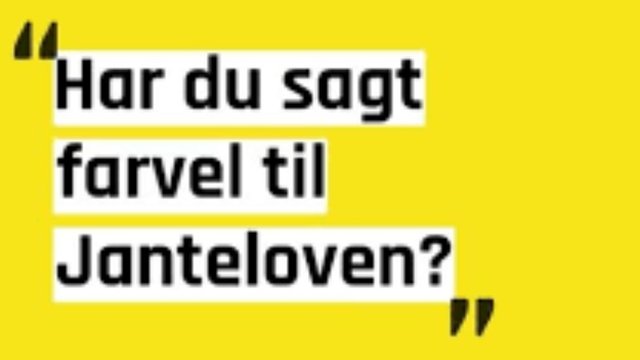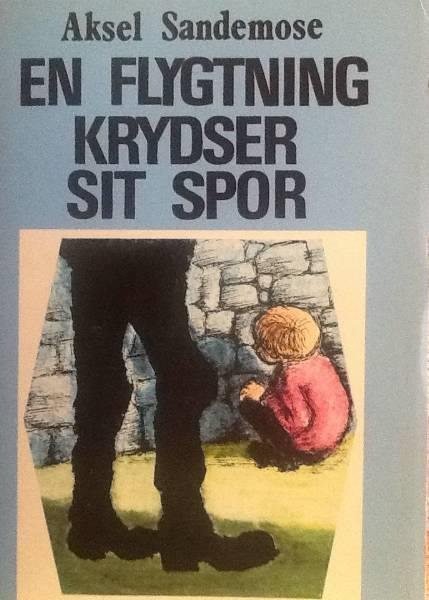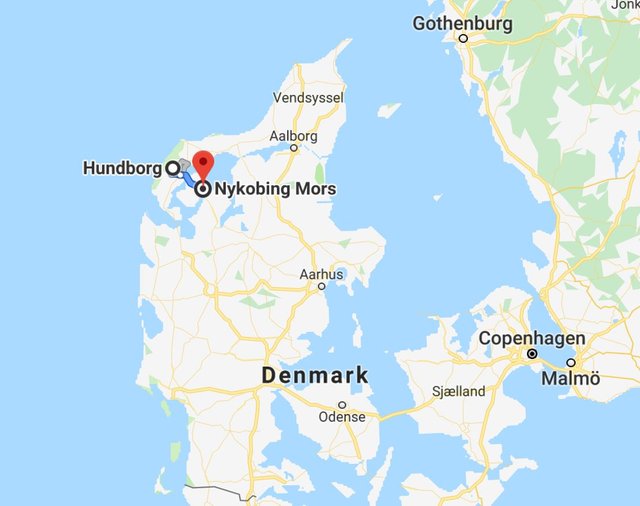The Danish social code of Janteloven

"Have you said goodbye to Janteloven?"
I'm part Danish. That's in addition to my mostly Scottish bits, as well as the Irish bits, Welsh bits, and that tiny strand of English DNA that makes me sound conceited. But how Danish am I, really? Because the answer to that question is what will qualify me, or not, to talk about an aspect of Scandinavian socialism that, frankly, not enough people are discussing.
And to be fair, my numbers aren't terribly impressive. Out of my eight great-grandparents, only one came from Denmark. Quantitatively, that means I'm only about 12.5 percent Danish and it all comes from my dad's Grandma Skow. But qualitatively I think I qualify well enough because, over the course of my life, I've experienced the unpleasant Danish phenomenon of Janteloven first hand from family members.
Janteloven (yente-lau'en) is the “Law of Jante,” a Danish social code that punishes or ostracizes a person for trying to be special, unique, or good at something. The term comes from a novel published in the 1930s about the fictional Danish town of Jante, "A Fugitive Crosses His Tracks" (En Flygtning Krydser Sit Spor). It was written by an unpleasant and possibly abusive man named Aksel Nielsen who grew up in Nykøbing Mors. You've probably never heard of it: it's a seaside resort town in Denmark just across the belt from my ancestral home, Hundborg in Thisted on the island of Vendsyssel-Thy.

Nielsen, the book's author, later changed his surname to Sandemose and, from what I understand, he wasn't a bad writer. Some compare his style to Joseph Conrad's. In his novel's fictional town of Jante, inhabitants followed the dictates of 10 rather oppressive social laws he dubbed “Jante Law”:
- You shall not believe that you are someone.
- You shall not believe that you are as good as we are.
- You shall not believe that you are any wiser than we are.
- You shall never indulge in the conceit of imagining that you are better than we are.
- You shall not believe that you know more than we do.
- You shall not believe that you are more important than we are.
- You shall not believe that you are going to amount to anything.
- You shall not laugh at us.
- You shall not believe that anyone cares about you.
- You shall not believe that you can teach us anything.
Don't assume (as some have) that Sandemose just made up these 10 laws using writers' artistic license. Michael Booth, a Brit who's married to a woman from Copenhagen and who wrote about Janteloven in The Paris Review back in 2015, noted that, “[T]he truth is, Sandemose really nailed the Danes. And not just the Danes: Jante Law sent ripples of recognition beyond Denmark—the Norwegians are all too familiar with them, and they act as an even more powerful normalizing force in Sweden. Yet raise the subject of Jante Law with Danes today and there will likely be some eye-rolling and a deep sigh or two. You will be told that the phenomenon has died out, that Sandemose’s satire is no longer relevant, a throwback to a time when most Danes were peasants. Even Queen Margaret condemned it in a New Year’s speech back in the eighties, they’ll say. These days, Danes are proud of their achievements, happy on behalf of others who enjoy success in life, and do not themselves hold back on exhibiting their success. Wait awhile, though, and the examples of 'friends' or 'relatives' who have suffered from the tyranny of Jante Law 'out in the provinces' will be shared.”
This social code is a thing and was a thing long before Sandemose bothered to document it. Booth claims that, even despite Copenhagen's more individualistic, big-city ways, Janteloven operates across all of Denmark on some level or another. Still, what Booth calls a “suffocating social conformity” tends to be strongest on the northern end of the peninsula of Jutland, where Nykøbing and Hundborg are located, and where my own critical, closed-minded Danish relatives happened to live.

Some of these same ancestors of mine came to America in the 1880s and settled in northeastern Iowa, in a little town where my dad grew up amongst a bevy of aunts and uncles already well indoctrinated into the code. In the 1960s, when my father wanted to move away and go to college at the University of Iowa, those same aunts and uncles mocked and belittled him, saying he wouldn't succeed and shouldn't even try. And in the 1970s, when I was in elementary school, my Danish grandmother scolded me for daring to mention that I'd gotten an A on a test.
In his book, “An Introduction to Danish Culture,” Norman Berdichevsky highlights the conflict often existing between Americans who move to Denmark and the conformist society they encounter there: “The Danish weekly newspaper Information ran a series of articles in January of 1981 on Americans in Denmark--Who Are They and Why Have They Come? Those who had found a permanent job, were well integrated, and had even mastered Danish were critical of the lack of initiative, high taxes and, as one individual named Steve put it, 'I was brought up to do things and get ahead. When I started work here, my colleagues told me immediately to set the pace slower. I learned that the system is arranged to benefit the slowest. Individualism and diligence aren't tolerated.'”
This aspect of Janteloven seems to at least partially explain the wave of 20th century socialism that gripped many Scandinavian countries. In 2017, Már Másson Maack
wondered aloud on TheNextWeb.com, “Maybe Americans weren’t ready to take the plunge into socialism with Bernie, but would calling it ‘Jantelov’ make it easier to adopt?” The basic leftist ideal of egalitarianism, that all people are equal, seems to have been taken to an intolerant extreme in Janteloven with the idea that achievement is to be punished.
So you can imagine my surprise when I met my current partner, @hanedane, a Danish man raised in Copenhagen, who also happened to be a four-time world champion in footbag (better known in the US as Hacky Sack).

@hanedane holding one of his footbag world champion trophies
Clearly, Janteloven was not a part of his upbringing in the south suburbs of Copenhagen and his family certainly doesn't exhibit its condemning attitude toward achievement. The more enlightened metropolitan area of Copenhagen does seem to defy Janteloven more than the rural areas, a difference that shows up when comparing his family to mine.
It was in meeting @hanedane that I became more curious about the origins of the code, just how far the Janteloven influence reaches, and where in Denmark or other Scandinavian countries it's been dropped. I'll be compiling a series of posts related to the history and expression of Janteloven, so if you're curious, too, stay tuned!


It's a seemingly counterproductive cultural trait, but I note that it isn't simply a Danish matter, as you do also. I cringe a bit at my own reluctance to blow my own horn, and also find similar cultural imperatives throughout the world, at least where I have any grasp of those cultures. It seems something that is endemic to our species, rather formalized in Denmark more than elsewhere, but present ubiquitously to varying degrees.
Interesting because it sheds some light on society itself, and how culture necessitates some conformance to be able to fit in.
Thanks!
What's really interesting to me is that it seeps down into the family unit. Usually boasting is considered gauche in "polite" society, but most people agree that boasting about your kids is pretty normal. With Janteloven, you can't even be proud of your kids or grandkids.
Hi @geke!
Your post was upvoted by @steem-ua, new Steem dApp, using UserAuthority for algorithmic post curation!
Your UA account score is currently 5.156 which ranks you at #974 across all Steem accounts.
Your rank has improved 20 places in the last three days (old rank 994).
In our last Algorithmic Curation Round, consisting of 174 contributions, your post is ranked at #141.
Evaluation of your UA score:
Feel free to join our @steem-ua Discord server